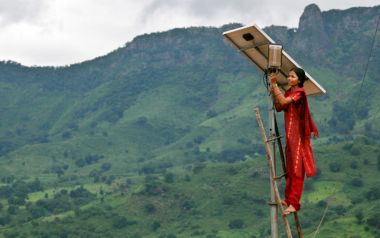In the effort to eliminate poverty worldwide, policies that address rural poverty must be central. The global rural poverty rate is higher than the urban poverty rate, and rural residents account for 80% of the extremely poor. Revitalizing rural areas so that they are productive, sustainable and healthy places to learn, work, and live can have a tremendous impact on global poverty.
Revitalizing rural areas to strengthen the connection between rural and urban economies can spur growth and diversify the farm and non-farm sectors to contribute to poverty reduction. Rural areas have the potential to become hubs of innovation and to drive the transformation of food systems and overall livelihoods.
Empowered rural economies can not only act as drivers of food security but also as springboards for national, regional, and global value chains and providers of quality environmental services. Policies that encourage investments in rural infrastructure, such as transport networks, telecommunications, and energy should be priority areas in this regard.
Countries that have successfully implemented rural revitalization can provide powerful lessons to the rest of the world. For instance, South Korea’s New Village Movement presents a key example of community-based rural development, while China’s Taobao Villages show that the use of e-commerce to foster entrepreneurship can help create flexible and inclusive employment opportunities.
Similarly, the European Union’s Smart Villages have utilized bottom-up strategies to harness digital connectivity for renewable energy, mobility, and e-service delivery in health and education. Creating dynamic opportunities and reducing poverty in rural areas is critical, especially in the rural areas of Africa and South Asia, where poverty is high and youth populations are large.
IFPRI’s 2019 Global Food Policy Report highlights that investing in agriculture—especially in the nonfarm sector, already a booming segment of the rural economy—can make rural areas hubs of innovation, spur job creation, and slow the tide of youth migration. For many years though, a key challenge to development in much of these rural areas has been a lack of reliable energy sources.
Energy is crucial to ensuring durable rural growth and development. Almost one billion people, mostly living in rural areas of Africa and South Asia, lack access to electricity. Securing access to reliable sources of energy is a necessary condition for fostering a dynamic rural economy.
It is difficult to imagine rapid and sustained reductions in rural poverty without it. Delivering power to remote rural areas using fossil fuels is often challenging and expensive, leaving many rural areas lacking consistent power.
But, dramatic declines in the cost of generating power from renewable energy sources such as solar and wind are creating new opportunities to provide rural areas with cheap, reliable sources of power and electricity.
Between 2010 and 2017, the levelized cost of electricity from solar and wind decreased by about 80% and 67%, respectively, making them cost-competitive in many circumstances with traditional energy sources such as coal, oil, and gas.
As renewable technology further improves and their production scales up, their prices will continue to fall, further enabling installation of power sources in rural areas that are cheap, clean, and reliable.
Solar and wind are distributed energy sources, so they produce power where they are installed and eliminate the need for delivering fossil fuels to rural areas or building a web of rural transmission infrastructure that delivers centrally generated power.
Sunshine and wind are also frequently abundant across the developing world, meaning there is great potential for smaller and medium-sized projects to harness this power where it is needed.
Such power can provide electricity to power machines that will drive more productive agriculture or industries, provide cold storage for medicines on their way to rural areas or produce on its way from farms to markets, and keep the lights on after nightfall for additional time to study, cook food, or socialize.
Experience and common sense dictate that access to reliable electricity underpins improvements across a range of human development indicators including productivity, health, and education. All of these improvements together can help drive down poverty, and lift the rural impoverished out of deprivation. They must be pursued if we’re to solve the poverty problem.
Shenggen Fan is Director General of IFPRI; Channing Arndt is Director of IFPRI’s Environment and Production Technology Division. This post first appeared in the Asia & the Pacific Policy Society Policy Forum.







